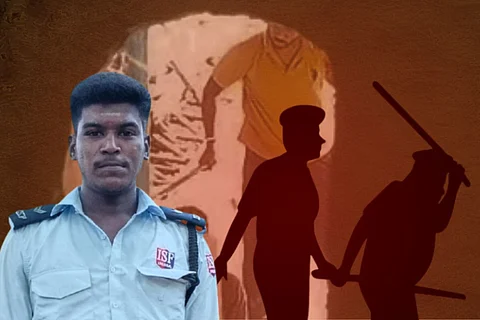New Delhi, India – July 12, 2025: The Central Bureau of Investigation (CBI), India’s premier investigative agency, has registered a case against police personnel from Sivagangai District, Tamil Nadu, over the alleged custodial death of Ajith Kumar, a 27-year-old temple security guard. The incident, which has sparked widespread outrage, occurred at the Madapuram Badrakaliamman Temple near Thiruppuvanam, highlighting concerns about police conduct and human rights in India.
The case stems from an incident on June 27, 2025, when Ajith Kumar was detained for questioning by a special police team following a complaint of jewelry theft. According to reports, a woman and her daughter, who visited the temple, alleged that gold jewelry worth approximately 10 sovereigns and cash were missing from their car after Ajith assisted with parking. Ajith, who did not know how to drive, had sought help to park the vehicle and returned the keys. Despite being questioned and released initially, he was detained again on June 28, 2025.
Ajith’s family alleges he was brutally tortured during interrogation, leading to his death on June 29, 2025. A post-mortem report revealed devastating details: at least 44 external injuries, including abrasions, contusions, and signs of severe internal bleeding, with some reports noting injuries consistent with cigarette burns and blunt force trauma. A video, recorded by a temple worker and widely circulated, allegedly shows police beating Ajith with sticks, contradicting initial police claims that he died of an epileptic seizure while attempting to escape.
The Tamil Nadu government, responding to public outcry and judicial pressure, transferred the investigation from the state’s Crime Branch Criminal Investigation Department (CB-CID) to the CBI. The Madurai Bench of the Madras High Court, which took up the case on its own initiative, expressed deep concern over the police’s conduct, noting that “even a murderer would not have caused this much injury.” The court ordered the CBI to appoint an investigating officer within a week and submit a final report by August 20, 2025.
Tamil Nadu Chief Minister M.K. Stalin condemned the incident, calling it an “unjustifiable mistake” and assuring full cooperation with the CBI probe. “The police must act in a way that upholds human rights and maintains public trust,” Stalin said, expressing regret to Ajith’s family. The state has provided Ajith’s brother, Naveen Kumar, with a government job and a plot of land as part of relief measures.
Five police officers have been arrested and are in judicial custody until July 15, 2025, while six others, including a deputy superintendent of police, have been suspended. The Sivagangai Superintendent of Police, Ashish Rawat, was placed on “compulsory wait,” and his duties were reassigned to Ramanathapuram SP G. Chandeesh.
The case has reignited debates about custodial violence in India, with activists pointing to a systemic failure to hold police accountable. Tamil Nadu has reported 24 custodial deaths since 2021, and critics note that convictions in such cases remain rare. The Madras High Court has also raised questions about procedural lapses, including the failure to register a First Information Report (FIR) promptly and the movement of Ajith’s body to Madurai, potentially to avoid CCTV evidence.
The CBI’s Special Crime Branch in Delhi, which previously investigated a similar high-profile custodial death case in Sathankulam, Tamil Nadu, will now lead the probe. The agency is expected to examine all evidence, including the post-mortem report, CCTV footage, and the video of the alleged assault, to determine the circumstances of Ajith Kumar’s death.
As public anger grows, opposition leaders and human rights groups are demanding justice and systemic reforms to prevent such tragedies. The case underscores India’s ongoing struggle with police accountability and the urgent need for stronger measures to protect citizens’ rights.





































